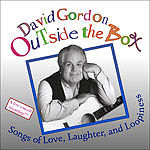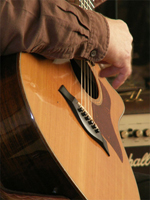About that Guy with the Guitar
He probably would have become proficient on the accordion when he was older had he not seen his teacher riding on a farm wagon pulled by a tractor in the Doylestown Memorial Day parade as she accompanied fledgling ballerinas from Candy's "Gotta Dance" Studio. He never went back for another lesson. This is a true story. The search for another creative musical outlet led naturally to the attic in the family house, where at the age of 13 he discovered his father's long-forgotten tenor banjo. Within a year David had graduated to a banjo with five strings, and was performing for literally tens of dollars monthly with local bluegrass and folk groups. David quickly added guitar, mandolin, and double bass to his instrumental skills, and by the time he entered the College of Wooster (Ohio) in 1965 he was busy performing solo gigs and with various bluegrass bands, particularly with Virgil Briggs and the Valley Ramblers in their ongoing weekend residency at Mac 'n El's Breezeway Bar in Mt. Eaton, Ohio. It was a grungy country music bar, the kind where the band is separated from the patrons by a permanent curtain of chicken wire, so the musicians can't be hit with flying beer bottles. This story is true, too. Why make things up when life is already this weird? 
David entered college with the intention of becoming a high school music teacher, but in his junior year the college presented Mozart's opera "Cosi fan tutte" and David was asked to sing the leading tenor role. He decided to quit the bar gig. The rest is history. In the world of classical music, David found an ambience somewhat more genteel than at Mac 'n El's Breezeway Bar. For one thing, the opera audiences seemed less likely to get drunk and throw things at the performers. And so he made his way through university and opera studies in Montreal (McGill University) and Chicago (the advanced training program at the Chicago Lyric Opera, his home company), lived in Europe for a while, and along the way established an international career as classical singer, teacher, lecturer, and recording artist. David has done all the usual high-end classical singerly things: he has appeared in thousands of opera and concert performances on four continents, he can be heard on 17 CDs for RCA, Telarc, London, Decca, and other major labels, and he has served on the music faculties of several major universities. There is information about this on David's SpiritSound website, if you're interested, but that's not the point.  This is the point: David wants to keep musical communication from becoming a lost art form. As a singer, David wants to communicate to anyone willing to listen. And the message he most wants to convey is that music has the power to promote peace, unity, and well-being. This message is his primary intention and central focus in performances. As a voice teacher, David encourages other singers to communicate, too. A lifelong student of the mind/body/music connection, David also teaches meditation and awareness through breath and sound. He has led retreats and workshops at the Esalen Institute in California, the Omega Institute in New York, and many other places throughout the USA and Canada. |
 Hailed by the Washington Post as "a model of style and charm, and an irresistible performer," David Gordon began his musical education on the accordion at the age of ten, studying with Miss Darlene Hunsberger at Pearlman's Record and Appliance Store in Doylestown, Pennsylvania.
Hailed by the Washington Post as "a model of style and charm, and an irresistible performer," David Gordon began his musical education on the accordion at the age of ten, studying with Miss Darlene Hunsberger at Pearlman's Record and Appliance Store in Doylestown, Pennsylvania.